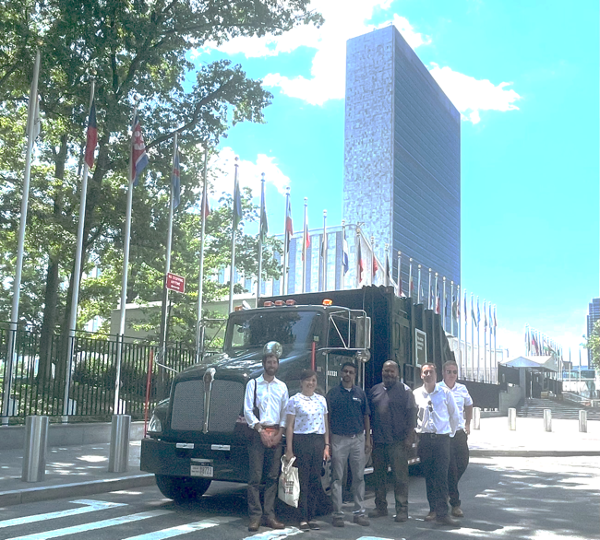
Truck of the Future
The Truck of the Future program works with cities and companies to equip their fleets with a broad range of innovative and scalable safety technologies from TSR's leading hardware and software member companies.

TSR’s Truck of the Future (TOF) pilots are a series of technology-focused programs designed to test innovative safety solutions from TSR members who provide best-in-class technology and hardware tools. These pilots aim to address a range of underlying crash causes — from blind zones, to speeding, to distraction. In addition, the TOF pilots test these solutions across a variety of vehicle types including heavy duty commercial trucks, school buses and electric-powered quads.
An innovative, technology-driven effort, the TOF program enables participating cities and companies to equip their fleets with state-of-the-art hardware and software solutions. In addition, pilot participants receive comprehensive training and support, creating a robust approach aimed at effectively integrating the technology into existing systems and procedures.
TOF Pilot: City of New York and AB InBev
Driver skill cannot overcome what the driver cannot see. Drivers of large vehicles often have limited visibility behind the wheel, making it difficult to make the safest choices. To address this safety challenge, TSR has partnered with VisionTrack, a leading global provider of AI video telematics and connected vehicle data, for the TOF pilot and associated hardware and software technology.
TOF vehicles feature state-of-the-art hardware and software that provides fleet vehicles with greater blind-zone detection and visibility. A Vulnerable Road User (VRU) Detection System is installed on TOF pilot fleet vehicles, designed to improve driver safety as well as the safety of pedestrians, cyclists, and motorcyclists, by using camera and audio technology to give a full 360-degree view of vision around the vehicle and provide real-time feedback on imminent risks and near-misses.
Hardware
Capabilities
All technology can be retrofitted onto existing fleets.
- Driver vulnerable road user (VRU) alerts
- Visual external alert for VRUs
- Driver blind spots (L/R) alerts
- Audible external alert for VRUs
- Rear camera alerts
- Configurable zone alerts
- In-cab display
- Accurate GPS data
- In-cab audible alerts
- Collision detection data
- Cloud-based AI platform – event footage and dashboards
- Near-miss tracking, reporting and analysis
Pilot Participants
The City of New York and AB InBev participated as initial TOF participants, allowing collaboration with and learning from both public and private sector fleets. Each selected vehicles to be retrofitted with the technology and identified teams to undergo training and onboarding to test and provide real-time feedback on the pilot.
AB InBev chose its Mexico City distribution center to model the program, providing insight into implementation within a private-sector fleet operating in an urban environment. In New York City, the pilot engaged public-sector fleets across multiple agencies, including the Departments of Parks and Recreation, Sanitation, and Environmental Protection, offering a diverse testing ground for the technology in municipal operations.
A critical question during the pilot was how these types of initiatives were best able to test and integrate new technologies, especially in the context of public-sector fleets, in ways that were efficient, cost-appropriate, and ultimately complementary to existing programs and objectives.
TSR partnered with the U.S. DOT’s VOLPE Center, with the support of the City of New York, to conduct a post-analysis of the pilot to better understand key learnings and performance indicators. The findings from this analysis can be found below under Resources.
School Bus of the Future Pilot: NYCSBUS
Building on the success of TSR’s Truck of the Future program, the School Bus of the Future pilot introduces advanced safety technology to school buses, adapting proven solutions to enhance student transportation safety. The program equips school buses with AI-powered surround cameras, near-miss detection systems, and in-cab alerts, tailored specifically for the challenges of urban school bus operations.
As a leading-edge initiative in school bus safety, the pilot explores how these advanced technologies can enhance driver awareness and improve protections for vulnerable road users, particularly in high-pedestrian and micro-mobility environments. The program evaluates key factors such as speeding, harsh driving, VRU alerting, and video triggers while incorporating manager and driver surveys to assess the effectiveness of the technology and its integration into daily operations.
By expanding the application of these safety innovations beyond commercial trucks, the program aims to set new standards for school bus safety and advance the use of cutting-edge technology in student transportation.
Pilot Participants
The School Bus of the Future pilot includes NYCSBUS, New York City’s premier independent school bus company, which provides safe, reliable, and efficient transportation for thousands of public school students across all five boroughs. With a focus on serving students and families, NYCSBUS brings operational expertise and a strong commitment to safety to the pilot, helping to test and integrate advanced technologies in one of the nation’s most complex urban transportation environments.

